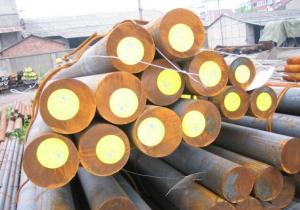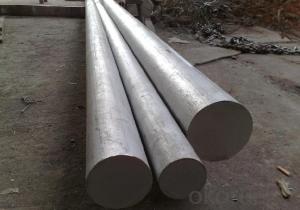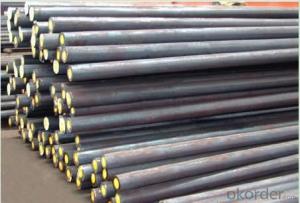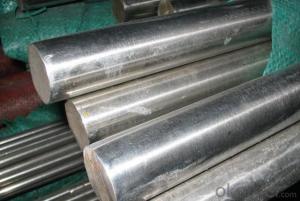HRB 400 Steel Rebar, Deformed Steel Bar
- Loading Port:
- China main port
- Payment Terms:
- TT OR LC
- Min Order Qty:
- 25 m.t.
- Supply Capability:
- 1000 m.t./month
OKorder Service Pledge
OKorder Financial Service
You Might Also Like
Item specifice
HRB 400 Steel Rebar, Deformed Steel Bar
Product information
1. Produce Standard: GB, AISI, ASTM, SAE, EN, BS, DIN, JIS
2. Produce processes: Smelt Iron -EAF smelt Billet - ESR smelt Billet -Hot rolled or forged get the steel round bar and plate
3. Heat treatment: Normalized / Annealed / Quenched+Tempered
4. Quality assurance: All order we can received third party inspection, You can let SGS, BV,.. and others test company test and inspect our products before Goods shipping.
Product detail
deformed steel bar steel rebar Chemical components (%)
| Grade | C | Si | Mn | P | S | Ceq |
| HRB335 | 0.25 | 0.8 | 1.6 | 0.45 | 0.45 | 0.52 |
| HRB400 | 0.25 | 0.8 | 1.6 | 0.45 | 0.45 | 0.55 |
Product show
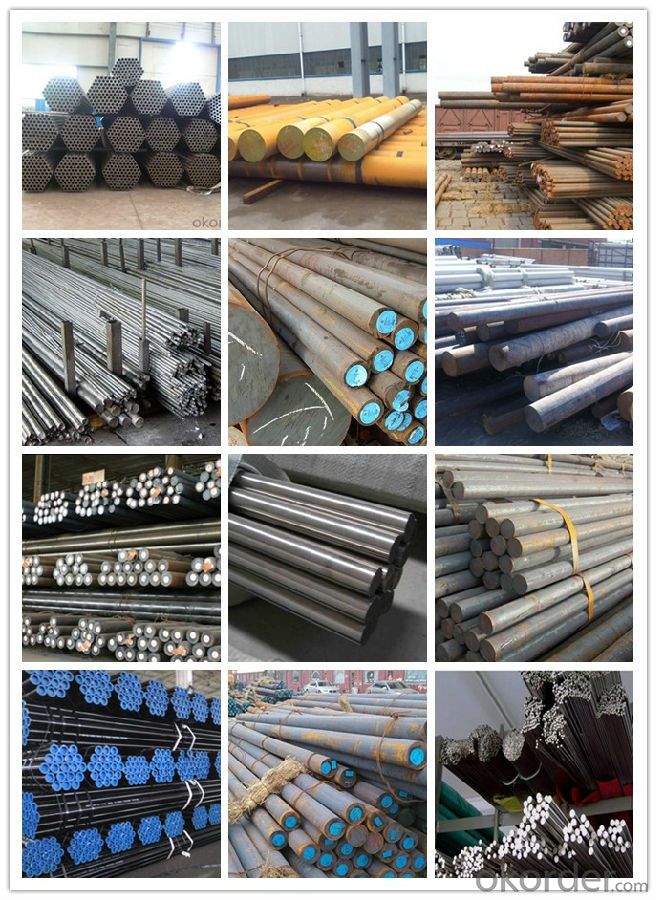
Work shop
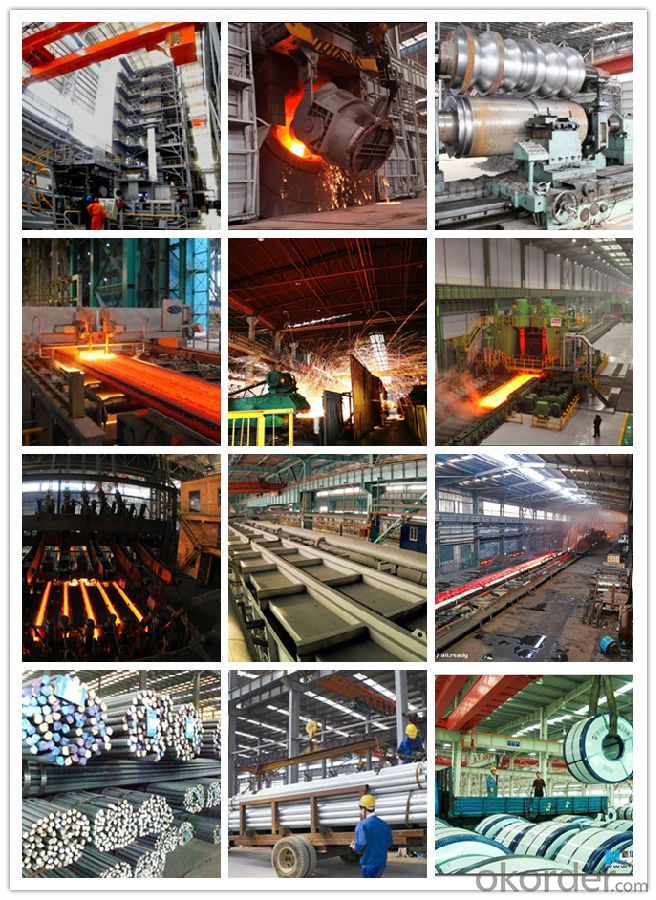
Our Services
* Welcome to contact us with your detailed inquiry, you will be replied within 24 hours.
* You are promised to obtain the best quality, price and service.
* We'd like to provide samples for your confirm.
- Q:How does special steel resist thermal fatigue?
- Due to its distinctive composition and properties, special steel possesses the ability to withstand thermal fatigue. When a material experiences repeated cycles of heating and cooling, cracks form and ultimately lead to material failure. Special steel, on the other hand, is specifically engineered to endure extreme temperature changes. It possesses a high melting point and exceptional thermal conductivity, enabling efficient heat dissipation and minimization of thermal stress. Furthermore, the steel is often alloyed with elements like chromium, nickel, and molybdenum, which augment its resistance to thermal fatigue. The alloying elements within special steel create a protective layer that acts as a barrier against oxidation and corrosion. This safeguard prevents crack formation and enhances the steel's capacity to withstand thermal cycling. Additionally, the alloying elements enhance the steel's structural integrity by encouraging the formation of finely dispersed and evenly distributed microstructures. This, in turn, amplifies the steel's toughness and crack resistance. Moreover, special steel undergoes various heat treatment processes to further enhance its resistance to thermal fatigue. These processes involve controlled cycles of heating and cooling, refining the steel's microstructure and rendering it more resistant to deformation and cracking. The heat treatment also aids in alleviating any residual stresses that may have been induced during the manufacturing process. In conclusion, special steel resists thermal fatigue due to its distinctive composition, alloying elements, and heat treatment processes. Its high melting point, exceptional thermal conductivity, and protective layer against oxidation and corrosion make it highly resilient to thermal cycling. The refined microstructure and alleviated residual stresses further strengthen its ability to endure repeated cycles of heating and cooling without experiencing failure.
- Q:How does special steel contribute to the automotive racing machinery industry?
- Special steel plays a crucial role in the automotive racing machinery industry by providing high-performance materials that enhance the performance, durability, and safety of racing vehicles. One of the primary contributions of special steel to the industry is its ability to improve the power and speed of racing cars. Special steel alloys, such as carbon fiber-reinforced steel or high-strength steel, offer superior strength-to-weight ratios, allowing manufacturers to reduce the weight of the vehicle while maintaining structural integrity. This reduction in weight enhances the acceleration and maneuverability of the racing car, resulting in increased speed and improved lap times on the track. In addition to improved performance, special steel also contributes to the safety of racing vehicles. The high strength and impact resistance properties of certain steel alloys make them ideal for constructing roll cages, chassis, and other critical safety components. These materials can withstand extreme forces during crashes or collisions, providing enhanced protection for the driver and minimizing the risk of severe injuries. Special steel also contributes to the longevity and durability of automotive racing machinery. The harsh conditions of racing, such as high temperatures, vibrations, and mechanical stress, can cause regular steel to deform or deteriorate quickly. However, special steel alloys are specifically engineered to withstand these demanding environments, ensuring that racing cars can endure the rigorous demands of the sport without compromising performance or safety. Furthermore, special steel alloys offer excellent thermal conductivity and heat resistance properties, which are essential for racing vehicles that generate immense heat during high-speed runs. By efficiently dissipating heat, special steel helps prevent overheating and ensures optimal engine performance, reducing the risk of mechanical failures and maximizing the lifespan of the racing machinery. In summary, special steel contributes significantly to the automotive racing machinery industry by enhancing the performance, durability, and safety of racing vehicles. The use of high-performance steel alloys helps increase speed, improve lap times, and reduce the weight of the vehicles. It also provides superior strength and impact resistance, enhancing safety during crashes or collisions. Moreover, special steel alloys offer excellent heat resistance and thermal conductivity, ensuring optimal engine performance and prolonging the lifespan of the racing machinery.
- Q:How does special steel perform under extreme temperatures?
- Special steel is designed to perform exceptionally well under extreme temperatures. It has high heat resistance, maintaining its strength and structural integrity even when exposed to extreme heat or cold. This makes it suitable for various applications, such as in aerospace, automotive, and power generation industries, where it can withstand the demanding conditions of extreme temperatures without compromising its performance.
- Q:What is the maximum temperature that special steel can withstand?
- The maximum temperature that special steel can withstand depends on the specific type of steel being used. Special steels are designed to have enhanced properties, such as high heat resistance, which allows them to withstand higher temperatures than standard steels. For example, some special steels, such as heat-resistant stainless steels, can withstand temperatures up to around 1200 degrees Celsius (2200 degrees Fahrenheit). These steels are often used in applications where high temperatures are encountered, such as in furnaces, boilers, and exhaust systems. Other types of special steels, such as tool steels or high-speed steels, may have different maximum temperature limits. These steels are commonly used in cutting tools, molds, and machining applications, where they need to maintain their hardness and strength at elevated temperatures. It is important to note that the maximum temperature that special steel can withstand also depends on factors such as the duration of exposure to the high temperature, the specific alloy composition, and any additional heat treatment processes that have been applied. Therefore, it is crucial to consult the manufacturer's specifications or seek professional advice for accurate information on the maximum temperature limit for a particular type of special steel.
- Q:What are the specific requirements for special steel used in the defense sector?
- The specific requirements for special steel used in the defense sector are highly demanding due to the critical nature of its applications. These requirements include: 1. Strength and Durability: Special steel used in the defense sector must possess exceptional strength and durability to withstand extreme conditions and resist wear and tear. It should be able to withstand high levels of stress, impact, and pressure. 2. Corrosion Resistance: Defense equipment often operates in harsh environments and is exposed to elements that can cause corrosion. Therefore, special steel used in the defense sector must have excellent corrosion resistance properties to ensure the longevity and reliability of the equipment. 3. Heat Resistance: Defense applications often involve exposure to high temperatures, such as in jet engines or armored vehicle components. Special steel used in these sectors must have the ability to retain its strength and structural integrity even at high temperatures. 4. Machinability and Weldability: Special steel used in the defense sector should have good machinability and weldability characteristics to facilitate the manufacturing and assembly processes. This allows for ease of fabrication, repair, and maintenance of the defense equipment. 5. Hardness and Toughness: Defense applications require special steel to have a combination of hardness and toughness. It should be able to resist penetration and deformation while maintaining the ability to absorb energy and resist fracture. 6. Non-Magnetic Properties: In certain defense applications, such as submarines and magnetic resonance imaging (MRI) equipment, non-magnetic properties are crucial. Special steel used in these sectors must possess low magnetic permeability to avoid interference with sensitive electronic systems. 7. Certification and Compliance: Special steel used in the defense sector must meet specific certification and compliance standards, such as those set by defense organizations or international quality management systems like ISO 9001. These standards ensure the quality, traceability, and reliability of the steel. Meeting these specific requirements for special steel used in the defense sector is vital to ensure the safety, effectiveness, and longevity of defense equipment and systems. Stringent testing and quality control processes are implemented to guarantee that the steel meets the required specifications and standards.
- Q:Can special steel be used in the production of luxury goods?
- Yes, special steel can be used in the production of luxury goods. Special steel is known for its exceptional strength, durability, and unique properties, making it an ideal material for creating high-quality and exclusive products. Its use in luxury goods such as watches, jewelry, high-end cutlery, and designer accessories can enhance their aesthetic appeal, performance, and overall value.
- Q:What are the different types of precipitation-hardening steel?
- There are several different types of precipitation-hardening steel, including 17-4 PH, 15-5 PH, 13-8 PH, and 17-7 PH. These alloys are known for their ability to be strengthened through a precipitation hardening process, which involves a combination of heat treatment and aging. Each type of precipitation-hardening steel has its own unique composition and properties, making them suitable for various applications in industries such as aerospace, automotive, and medical.
- Q:How does special steel withstand extreme temperatures?
- Special steel is designed to withstand extreme temperatures due to its unique composition and manufacturing process. It contains a higher percentage of alloying elements, such as chromium, nickel, and molybdenum, which enhance its heat resistance properties. These alloys form a protective layer on the surface of the steel, preventing oxidation and corrosion at high temperatures. Additionally, special steel undergoes specific heat treatment methods, such as quenching and tempering, which further enhance its ability to withstand extreme temperatures without losing its strength and structural integrity.
- Q:What are the requirements for special steel used in chemical processing?
- The requirements for special steel used in chemical processing include high corrosion resistance, exceptional strength and durability, resistance to high temperatures and extreme pressure, and compatibility with the specific chemicals being processed.
- Q:How does special steel contribute to the power generation sector?
- The power generation sector greatly relies on special steel due to the numerous benefits it offers and its contribution to the overall efficiency and reliability of power generation equipment. Special steel plays a vital role in this sector by providing superior strength and durability, which is essential given the demanding and extreme conditions involved in power generation, such as high temperatures, pressure, and corrosive environments. By being specifically designed to withstand these harsh conditions and maintain its structural integrity, special steel ensures the long-term reliability and safety of power generation equipment. Various components of power generation equipment, including turbines, boilers, and generators, benefit from the use of special steel. For instance, gas turbines utilize special steel for the construction of turbine blades and vanes, which endure immense heat and rotational forces. Special steel's high-temperature resistance and strength enable these components to operate efficiently at elevated temperatures without deformations or failures, thus enhancing the performance of gas turbines. Furthermore, special steel exhibits excellent corrosion resistance, making it suitable for power plants that employ water-based cooling systems. These cooling systems often use seawater or chemically treated water, which can be highly corrosive. By incorporating special steel in critical components like condensers and heat exchangers, the power generation sector significantly reduces maintenance and replacement costs associated with corrosion-related issues. Moreover, special steel plays a crucial role in the construction of nuclear power plants. It is utilized in the fabrication of reactor pressure vessels, steam generators, and fuel assemblies. The radiation resistance and high strength of special steel ensure the safety and reliability of these components in nuclear power plants, thereby contributing to the overall efficiency and sustainability of the power generation sector. In conclusion, special steel's exceptional strength, high-temperature resistance, corrosion resistance, and radiation resistance make it an indispensable material in the power generation sector. Its usage enhances the efficiency, reliability, and safety of power generation equipment, ultimately contributing to the growth and sustainability of the power generation industry as a whole.
1. Manufacturer Overview |
|
|---|---|
| Location | |
| Year Established | |
| Annual Output Value | |
| Main Markets | |
| Company Certifications | |
2. Manufacturer Certificates |
|
|---|---|
| a) Certification Name | |
| Range | |
| Reference | |
| Validity Period | |
3. Manufacturer Capability |
|
|---|---|
| a)Trade Capacity | |
| Nearest Port | |
| Export Percentage | |
| No.of Employees in Trade Department | |
| Language Spoken: | |
| b)Factory Information | |
| Factory Size: | |
| No. of Production Lines | |
| Contract Manufacturing | |
| Product Price Range | |
Send your message to us
HRB 400 Steel Rebar, Deformed Steel Bar
- Loading Port:
- China main port
- Payment Terms:
- TT OR LC
- Min Order Qty:
- 25 m.t.
- Supply Capability:
- 1000 m.t./month
OKorder Service Pledge
OKorder Financial Service
Similar products
New products
Hot products
Hot Searches
Related keywords

